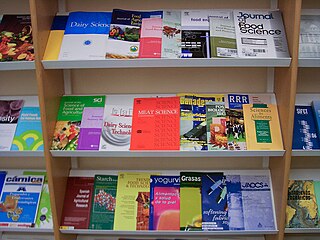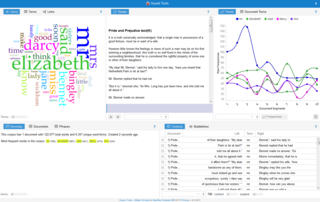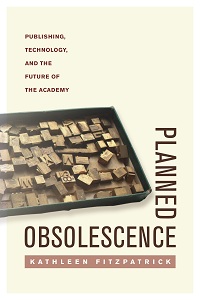
In academic publishing, a preprint is a version of a scholarly or scientific paper that precedes formal peer review and publication in a peer-reviewed scholarly or scientific journal. The preprint may be available, often as a non-typeset version available free, before or after a paper is published in a journal.
Electronic publishing includes the digital publication of e-books, digital magazines, and the development of digital libraries and catalogues. It also includes the editing of books, journals and magazines to be posted on a screen.

Academic publishing is the subfield of publishing which distributes academic research and scholarship. Most academic work is published in academic journal articles, books or theses. The part of academic written output that is not formally published but merely printed up or posted on the Internet is often called "grey literature". Most scientific and scholarly journals, and many academic and scholarly books, though not all, are based on some form of peer review or editorial refereeing to qualify texts for publication. Peer review quality and selectivity standards vary greatly from journal to journal, publisher to publisher, and field to field.

An academic journal or scholarly journal is a periodical publication in which scholarship relating to a particular academic discipline is published. Academic journals serve as permanent and transparent forums for the presentation, scrutiny, and discussion of research. They are usually peer-reviewed or refereed. Content typically takes the form of articles presenting original research, review articles, or book reviews. The purpose of an academic journal, according to Henry Oldenburg, is to give researchers a venue to "impart their knowledge to one another, and contribute what they can to the Grand design of improving natural knowledge, and perfecting all Philosophical Arts, and Sciences."
A book review is a form of literary criticism in which a book is merely described or analyzed based on content, style, and merit. A book review may be a primary source, opinion piece, summary review or scholarly review. Books can be reviewed for printed periodicals, magazines and newspapers, as school work, or for book web sites on the Internet. A book review's length may vary from a single paragraph to a substantial essay. Such a review may evaluate the book on the basis of personal taste. Reviewers may use the occasion of a book review for an extended essay that can be closely or loosely related to the subject of the book, or to promulgate their own ideas on the topic of a fiction or non-fiction work.
The American Council of Learned Societies (ACLS), founded in 1919, is a private, nonprofit federation of 75 scholarly organizations in the humanities and related social sciences. It is best known for its fellowship competitions which provide a range of opportunities for scholars in the humanities and related social sciences at all career stages, from graduate students to distinguished professors to independent scholars, working with a number of disciplines and methodologies in the U.S. and abroad.

Digital humanities (DH) is an area of scholarly activity at the intersection of computing or digital technologies and the disciplines of the humanities. It includes the systematic use of digital resources in the humanities, as well as the analysis of their application. DH can be defined as new ways of doing scholarship that involve collaborative, transdisciplinary, and computationally engaged research, teaching, and publishing. It brings digital tools and methods to the study of the humanities with the recognition that the printed word is no longer the main medium for knowledge production and distribution.

H-Net is an interdisciplinary forum for scholars in the humanities and social sciences. It is best known for hosting electronic mailing lists organized by academic disciplines; according to the organization's website, H-Net lists reach over 200,000 subscribers in more than 90 countries.

Project MUSE, a non-profit collaboration between libraries and publishers, is an online database of peer-reviewed academic journals and electronic books. Project MUSE contains digital humanities and social science content from over 250 university presses and scholarly societies around the world. It is an aggregator of digital versions of academic journals, all of which are free of digital rights management (DRM). It operates as a third-party acquisition service like EBSCO, JSTOR, OverDrive, and ProQuest.

HASTAC (/ˈhāˌstak/') also known as the Humanities, Arts, Science and Technology Alliance and Collaboratory, is a virtual organization and platform of more than 18,000 individuals and 400+ affiliate-institutions dedicated to innovative new modes of learning and research. HASTAC network members contribute to the community by sharing work and ideas with others via the open-access website, by hosting HASTAC conferences and workshops online or in their region, by initiating conversations, or by working collaboratively with others in the HASTAC network.
The Applied Research in Patacriticism (ARP) was a digital humanities lab based at the University of Virginia founded and run by Jerome McGann and Johanna Drucker. ARP's open-source tools include Juxta, IVANHOE, and Collex. Collex is the social software and faceted browsing backbone of the NINES federation. ARP was funded by the Mellon Foundation.
Scholarly communication involves the creation, publication, dissemination and discovery of academic research, primarily in peer-reviewed journals and books. It is “the system through which research and other scholarly writings are created, evaluated for quality, disseminated to the scholarly community, and preserved for future use." This primarily involves the publication of peer-reviewed academic journals, books and conference papers.
Bepress is a commercial, academic software firm owned by RELX Group. It began in 1999 as the Berkeley Electronic Press, co-founded by academics Robert Cooter and Aaron Edlin. It makes products and services to support scholarly communication, including institutional repository and publishing software. Until September 2011 it also published electronic journals.
Kathleen Fitzpatrick is an American scholar of digital humanities and media studies. She is the Director of Digital Humanities and Professor of English at Michigan State University.
Vectors: Journal of Culture and Technology in a Dynamic Vernacular is a peer-reviewed online academic journal published by the USC School of Cinematic Arts. It was established in March 2005 and covers the digital humanities, publishing work that "cannot exist in print". Vectors is recognized as an experimental precursor to the digital humanities, producing and publishing a range of highly interactive works of multimedia scholarship. Comparing Vectors with more traditional digital humanities publications, Patrick Svensson notes that, "Vectors, on the other hand, is clearly invested in the digital as an expressive medium in an experimental and creative way". The journal no longer actively produces projects or provides support to journal contributors but does accept completed submissions on a rolling basis. The editors-in-chief are Tara McPherson of the USC School of Cinematic Arts and Steve F. Anderson of the UCLA School of Theater, Film & Television.

The William Blake Archive is a digital humanities project started in 1994, a first version of the website was launched in 1996. The project is sponsored by the Library of Congress and supported by the University of North Carolina at Chapel Hill and the University of Rochester. Inspired by the Rossetti Archive, the archive provides digital reproductions of the various works of William Blake, a prominent Romantic-period poet, artist, and engraver, alongside annotation, commentary and scholarly materials related to Blake.
Steve F. Anderson (1963) is Professor of Digital Media at the UCLA School of Theater, Film and Television. Previously, he served as founding director of the Ph.D. program in Media Arts and Practice at the USC School of Cinematic Arts and an Associate Professor in the USC Interactive Media & Games Division. He co-edits the interdisciplinary electronic journal Vectors Journal of Culture and Technology in a Dynamic Vernacular and is the founder of Critical Commons, an online media archive and fair use advocacy network. He is author of the books Technologies of Vision: The War Between Data and Images and Technologies of History: Visual Media and the Eccentricity of the Past. With Christie Milliken he is co-editor of the anthology Reclaiming Popular Documentary.

Planned Obsolescence: Publishing, Technology, and the Future of the Academy is a book by Kathleen Fitzpatrick, Director of Scholarly Communication at the Modern Language Association and Visiting Research Professor of English at New York University, published by NYU Press on November 1, 2011. The book provides an overview of issues facing contemporary academic publishing, including the closing of academic presses and the increased pressure on faculty to publish to achieve tenure. Fitzpatrick's central argument is that academia should embrace the possibilities of digital publishing, which will in turn change the culture of academic writing and publishing.
A mega journal is a peer-reviewed academic open access journal designed to be much larger than a traditional journal by exercising low selectivity among accepted articles. It was pioneered by PLOS ONE. This "very lucrative publishing model" was soon emulated by other publishers.

Cheryl Ball is an academic and scholar in rhetoric, composition, and publishing studies, and Director of the Digital Publishing Collaborative at Wayne State University. In the areas of scholarly and digital publishing, Ball is the executive director for the Council of Editors of Learned Journals and the Editor-in-Chief for the Library Publishing Curriculum. Ball also serves as co-editor of Kairos: A Journal of Rhetoric, Technology, and Pedagogy, an open access, online journal dedicated to multimodal academic publishing, which she has edited since 2006. Ball's awards include Best Article on Pedagogy or Curriculum in Technical or Science Communication from the Conference on College Composition and Communication (CCCC), the Computers and Composition Charles Moran Award for Distinguished Service to the Field, and the Technology Innovator Award presented by the CCCC Committee on Computers in Composition and Communication (7Cs). Her book, The New Work of Composing was the winner of the 2012 Computers and Composition Distinguished Book Award. Her contributions to academic research span the areas of digital publishing, new media scholarship, and multimodal writing pedagogy.









